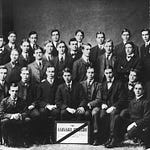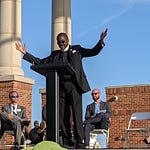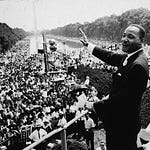
This post is on the China beat. It’s an argument about how American institutions—press, academic, entertainment, government, business—should respond to the China that has emerged under Xi Jinping. Including Xi Jinping’s recent decision effectively to ally his country with Russia, despite ongoing Russian atrocities in Ukraine.
(As a programming note, for the many readers who share my admiration for the late Eric Boehlert, and the sense of loss after his tragic accidental death last week: the next item in this space will be a number of Boehlert-inspired points on the media beat.)
For the moment I direct your attention to Isaac Stone Fish, author of the new book America Second. Stone Fish is a “China hand” in his late 30s, who speaks Mandarin and lived in the country for seven years. Those years happened to overlap with the time my wife, Deb, and I were based there. He has worked as a correspondent and editor for Newsweek and Foreign Policy; he has written columns and reports for the Washington Post and countless other publications; and he now runs a consulting firm called Strategy Risks.
The subtitle of his new book distills the argument. It is How America’s Elites Are Making China Stronger. The book was published recently by Knopf. In it he contends … well, I’ll let you hear that from Stone Fish himself.
The clip above is a 40-minute discussion we had this past Friday—April 8, 2022. I think it is all worth listening to. If you’d like to read it, a full transcript is in an accompanying post, here. (Tech note: We recorded the discussion with the wonderful Zencastr software. It was then transcribed, with amazingly high accuracy, by Otter.ai, which I’ve described before, and which continues to improve. For instance, every proper name in this discussion, from Isaac Stone Fish himself to Michael Eisner to Zhu Rongji, was correctly parsed by Otter. On the other hand, it misspelled Annus Horribilis. So there is still room for growth.)
Below are some of the highlights of the discussion. The time marks are tied to their approximate place in the podcast. I hope you’ll listen to the whole thing, and read Isaac Stone Fish’s book.
Highlights from the podcast
Some of these points have been condensed or combined; the full transcript is here, and the podcast is above.
Q: James Fallows 00:01
For those who have not yet read the book, what's the precis of the point you're making?
A: Isaac Stone Fish 00:26
The book looks at Beijing's influence the United States and how to push back without being McCarthyist or racist.
And the book argues that, for decades through a subtle and sophisticated process, Beijing has changed the way that Hollywood works; has changed the revolving door in DC between the foreign policy community and businesses; has had a really large impact on universities. It also reminds people that for so long, it was stated US policy to strengthen China, which means strengthening the Communist Party. And finally, the book explains how things don't have to be how they are, and how you can push back against Beijing, and keep your business and morals mostly intact.
‘Getting China wrong’
Q: 03:22
We’ve all had arguments and reflections about whether people had ‘gotten China wrong’ long ago. Whether it was naive 25 or 30 years ago, to try to foster China's development—whether people had been gulled, whether there were things that people need to reconsider. How do you view the ‘getting China wrong’ question?
Isaac Stone Fish 04:03
I think it's so easy with hindsight to point fingers and pick out mistakes, and I do a lot of that in the book.
But I want to say that it's very seductive to think, ‘Oh, we can do well, by doing good. We can change China. And we can liberalize China and make money doing so in the process.’
… The question that I struggle with throughout the book is, how much do you fault people for their intentions? And how much do you fault people for their actions? One of the people I interviewed for the book, Stapleton Roy, who was an ambassador to China, in the 90s, said – and I'm paraphrasing here -- no one actually believed in the policy. It was used to sell the policy as opposed to govern the policy, so to speak…
‘Is the world better off…?’
Q: 07:48
And to ask this question in the bluntest form, would the US and the world have been better off, now, if China had been excluded over the last 25 or 30 years? As opposed to the now-complex process of trying to include them?
Isaac Stone Fish 08:09
It's a great question. I'm glad you're pushing me on it. And I'm glad you're asking it bluntly. And I'm trying to think to see what's the right answer.
So let me answer in the easier way: the world would be better off if China were a democracy, the world would be better off if China were a weaker state.
A lot of Chinese people would be worse off. But I would argue that the global commons would be better off, we'd be better off, if the United States had set better guardrails around Taiwan, around IP than they did in the heady days when we couldn't imagine China being what it was today.
But as Nixon said, in his pivotal Foreign Affairs essay, we can't keep China outside the, he called it the [League of Nations] to nurse their grievances. [Stone Fish clarified later to say that Nixon actually said “family of nations” to “nurture its fantasies.”] And there, it feels too colossally unfair to allow China to remain in its self imposed isolation after 1976. And so I'm glad there has been limited engagement.
But I do feel like for too often, United States institutions and individuals give up more than they get. So I guess to answer your blunt question: No, I don't think the world will be better off having cut China completely out of the global system. I do think however, it should have been a far more managed and far more restricted process.
Is it too crude to say that people are ‘selling out’?
Q: 09:41
Here's a similarly blunt query inspired by your blunt title, America Second. A way to oversimplify your argument would be that a number of American forces have essentially sold out. You’re talking about governmental officials and universities and entertainment companies and corporations and all the rest. Is that too crude a statement of what you're saying?
Isaac Stone Fish 10:07
No, I think that's accurate. And I tried to spend a lot of time in the book talking about my own sins and my own hypocrisy, because I don't believe in the that sort of let he who without what's the biblical quote, you know, he without sin casting the first stone.
I've made a lot of mistakes that I criticize others for making….
‘A businessman masquerading as a statesman’
Q: 11:20
In the realm of public officials, you mentioned almost everybody who's been prominent on the US side, in the last generation. Let me start with somebody who's probably the most prominent public official in your book. That is Henry Kissinger. Tell us the precis of your argument.
Isaac Stone Fish 11:51
From 1982, the year Kissinger founded Kissinger Associates to the present, Kissinger has been a businessman masquerading as a statesman.
There's nothing wrong with going into business. There's nothing wrong with leaving government and deciding to start a business. The issue is when you pretend that you're not a businessperson—you pretend you're a speaker, a journalist, a writer, you pretend that you're acting without constraints when you have these huge amounts of constraints on the work that you're doing.
For so long Kissinger has amplified positive voices about China and suppressed negative ones, which is a classic United Front and party friendship tool. He dampened criticism of China within most administrations, from the Reagan administration to the present. He was the reason why Newt Gingrich reduced his support for Taiwan. He was reportedly the reason why Trump broke with decades of precedent to become the first president since Ronald Reagan to not meet with the Dalai Lama. And he was doing it while making hundreds of millions of dollars helping US companies work in China, and with at least several known instances, helping the Chinese Communist Party's companies, state owned enterprises, companies with deep links to the party, make more money in China and elsewhere.
I have been stunned by the cone of silence surrounding Kissinger. And I have been stunned by the reluctance of so many people who had publicly criticized Kissinger in the past to do so again in the future. And I'll share with you a quote with someone whose name I would love to mention, but won't as he told it to me off the record. He is a prominent foreign policy commentator who had criticized Kissinger in the past, so I talked to him about it. He was very generous, explaining what had happened. I said, Great. Can I use that on the record? And he said, No, I'm just getting invited back to dinners.
And who illustrates the opposite path?
Q: 16:35
Is there anybody you think of as the antithesis to that? Somebody who represents a steady, independent view of China policy, who has some prominence in the foreign policy world?
Isaac Stone Fish 17:06
Sadly, my two best examples are Richard Nixon and George W. Bush. Because from a consulting and mercenary perspective, they I think, were the two best ex-presidents of the last 50 or 60 years.
Nixon went on a secret trip to China after Tiananmen Square, and he brought a policy aide, Kissinger went on a secret trip to China after Tiananmen Square, he brought Hank Greenberg and Judith Hope, who were both basically clients of his. So Kissinger travels with his business associates and helps them make money. And Nixon travels with someone who can help him make good policy suggestions. [George W.] Bush really resisted the lure of so many other members of the Bush family to do a lot of high profile consulting with companies seeking to do business in China. And for all of the many faults of Nixon and Bush's presidency, I really do commend them for staying on the sidelines when it comes to the consulting business with China.
[As for Jimmy Carter, for whom JF once worked:] I think the Carter Center did phenomenal work in China. When you could do phenomenal human rights work in China. You know, when they were pushing for village elections, I thought that was incredibly important and impactful. And I think had Carter pulled out at some point under Xi Jinping, three years ago, five years ago, I feel like his record would be much better. But he or the people making the decision at the Carter Center, I thought that they could still push. And they in doing so made some, I would say fairly large ethical sacrifices in the work that they're doing.
In the book I hold universities and organizations like the Carter Center to a higher standard than I do businesses. And perhaps that's not fair. You know, we expect businesses to compromise ethically, we expect that politicians but we do feel like universities think tanks, nonprofits should be held to a higher intellectual standard. And so the Carter Center not speaking up and spreading positive information, Chinese propaganda, I find to be more problematic than when say a company like Disney doesn't.
How the movie industry is different from TV
Q: 21:03
Talking about Disney, one of the things that's fascinating in your book is the distinction between the movie industry, where you have many details of how it has been cowed by the idea of a Chinese market. And TV, which you say has been much, much more outspoken on all the issues you're talking about. Explain the difference and the reason for it.
Isaac Stone Fish 21:25
1997 was Annus Horribilis for China in Hollywood. Three movies – Kundun, Seven Years in Tibet, Red Corner -- came out that had portrayals of China and Tibet that the party decided to find offensive….
So they banned Hollywood studios, made it clear to Hollywood studios that they were in the doghouse, slowly told them why and allowed them to send their leaders to China to apologize and to see how they could get back into the Chinese market. There's this really fascinating episode of the CEO of Disney at the time going to meeting with the Chinese Premier Zhu Rongji. And in Zhu Rongji’s speeches, he talks about the incident. So Eisner goes and gets into the meeting room, and Zhu says, Hey, it's great to see you. You're Frank Wells, right? [The late former president of Disney, and someone never confused in Hollywood with Michael Eisner].
This is someone who's so accustomed to being the center of attention, and Zhu just immediately puts him in his place....
TV never had a 1997. TV never had an incident like that. Somehow -- and this is something I'd love someone to really dive into -- I just feel like television in this aspect made a lot more ethical choices. And I don't know why. But I'd be very curious to understand that television and music for that matter. Music is another industry that doesn't travel as well as film, that it's a smaller music market than film market. But something else happened that I feel like needs a more sophisticated writer than myself to really untangle.
‘What you wouldn’t say about Jewish characters in movies, you shouldn’t say about Chinese characters either.’
Q: 24:17
A final question on movies. Is there any corrective or hope? Or is the portrait you give of the movie industry, being just too afraid of the Chinese government, is that more or less a one way street?
Isaac Stone Fish 25:14
I've been very impressed to see Hollywood diversity campaigns at the Oscars, as a way to push for more black actors, a push for representation. What I think people haven't understood yet, but should, is just how racist it is to show only one side of people. I'm Jewish, and if every Jewish character in a film was a doctor, or a lawyer or a successful businessman, and you had character saying things like, ‘God, I'm so glad I have a Jewish lawyer, now my problems are going to be solved’—there would be a such a massive outcry. That's not a human portrayal. And that's what you have with Chinese characters in movies today in Hollywood.
China, Russia, Ukraine — and Taiwan
Q: 29:43
Let me ask you about something that is the center of world news right now, which is the disaster in Ukraine, the Russian invasion of Ukraine and the atrocities going on there. China appears has welded itself to Russia in the international lineup. How should we interpret what the Chinese government is doing in this time of atrocity?
Isaac Stone Fish 30:27
I think Beijing wants to have it both ways. I think they want the war to go on for as long as possible, because I think they feel that Europe distracted and the United States distracted.. will make it more likely for them [the PRC] to increase their adventurism in Asia. I think they also don't want people to think that they're that close with Russia, partially because it's embarrassing. So I think they're trying to communicate both of these things at once, which is that we don't support Russia. It's just that the war is the United States’ fault and Europe's fault.
Q: 31:34
Is China doing itself any damage by seeming to choose Putin over Zelenskyy?
Isaac Stone Fish 31:43
I hope so. I hope it is doing itself damage.
Q: 32:37
A subject we could talk about for hours, but concisely: do you think the Ukrainian disaster has made it more, or less, likely that the PRC would invade Taiwan?
Isaac Stone Fish 32:51
Gosh, I'd say it doesn't change the likelihood. I think it changes the likelihood that people will predict it and can understand that it is probably looming, but I don't think it's pushed Beijing in one direction or another.
‘If you take it out on a Chinese person, you are doing Beijing a huge favor.’
Q: 34:55
One last question for you, which gets us to where your book ends up
Your book has, as you've also expressed here, a very cautionary and hard-edged argument about a big mistake that the US is making. You’ve also had a lot of experience in China, a lot of connections with Chinese culture and Chinese people.
How does the US thread the needle or avoid the overreaction of anti-Asian hate crimes and anti-Chinese backlash and all the other things which – well, which Donald Trump, to choose an example, seem to personify. What is the way people can understand a hard-edged policy like yours, while avoiding all the human and cultural damage it could do?
Isaac Stone Fish 36:08
For ethical and strategic reasons, it's so important that this be done in a way that's non-discriminatory. Non-discriminatory towards Chinese, and Chinese Americans.
I really need people to understand, both for very clear, ethical reasons and very clear strategic reasons: If you're frustrated with Beijing's influence the United States, if you're frustrated with China, the Chinese Communist Party, if you're frustrated with COVID, or job loss or anything, and you take it out on a Chinese person, you are doing Beijing a huge favor. People really need to understand that.













Podcast with Isaac Stone Fish: ‘America Second’